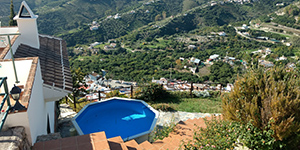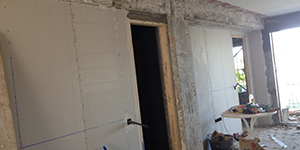As hopefully is now clear; buying a house in Spain is a lot more complicated than in the U.K or other European countries. In this chapter ´10 Examples of problems when buying a house in Spain´you can read why. Sometimes this leads to problems with the house purchase. The notary is not responsible for the investigation into the legal status of the house or into any outstanding debts. There are also 2 authorities for registrations – the Land Registry and Cadastre – that are not automatically linked to each other. This often creates administrative and legal problems, especially in rural/rustic areas.
Most buyers know that it is wise to hire a lawyer when you buy a house in Andalusia. I am always slightly baffled when new clients arrive at our office who have to hire legal help after they have already bought because of various problems. This happens to us about 5 to 10 times a year.

Inhoud
Buying cheap or buying smart?
Some buyers are simply naive or too gullible. Other “smart” buyers, however, think that with a little Googling and Google Translate you can save those 1% attorneys’ fees. However, the problems that buyers can encounter are really very diverse. It just depends on the exact circumstances whether the problems can still be solved (free of charge) or not. Solving problems almost always costs much more than the initial costs of the lawyer.
Most purchases have little or no problems at all
However, the situation may no longer be resolved and, in the worst-case, buyers will be left with the problem of an unsaleable home. Or with seriously decreased value. These practical examples are obviously not intended to deter buyers. The vast majority of foreign buyers buy without any problems and are very happy with their investment. However, make sure that you hire a lawyer, and preferably one who really specializes in real estate law.
10 EXAMPLES PROBLEMS BUYING HOUSE SPAIN
Below I describe a number of examples of purchases that I have experienced at our law firm since 2013. Incidentally, they are not all clients who bought without a lawyer, but also cases of ‘normal’ clients who would have ended absolutely wrong without the correct legal guidance.
The names are of course changed and sometimes also the names of the municipalities concerned. Since I am not a lawyer myself, I will not elaborate on the technical/legal substantiation.
1. Correctly registered in the Land Registry and Register but still illegal

area without DAFO-certificate
Hendrik and Peter were clients who wanted to buy a house in a small village in the Axarquia in 2017. Everything looked well on paper, all square meters appeared to be correctly registered in the Land Registry and the Cadastre. This is how far the check stretches out that many brokers themselves already do. (Although they are not obliged to do so).
However, a lawyer always contacts the Town Hall for several issues. That is how he found out that the country house turned out to be on land that had been declared a protected nature reserve a few years ago. The buildings were more than 6 years old, as the law of the Junta de Andalusia prescribes in the countryside. But in this case, this was not enough. In a protected nature reserve, you have to count back from the year when the protection gets in force. Depending on the date, this is 4 to 6 years. So it turned out that the house was completely illegal. It could no longer be ‘legalized/regularized’ via a DAFO certificate.
Illegal First Occupation License makes Town Councel liable
In this case, the clients decided to buy the house anyway. This was because after our negotiation with the seller they could get a very significant price reduction. The decisive factor was that the house had obtained a First Occupation License from the Municipality. This means that at the time the town could be held financially liable in the event of forced demolition. The Municipality is therefore fully aware of the situation, but will never actively take action against these illegal buildings. Of course, we explained the situation very clearly to Peter and Hendrik. Ultimately, the price reduction was so sharp that they accepted this legal handicap. Of course, they will never be able to sell with a DAFO, so the house will yield less than a regularized house.
2. Building a swimming pool in the countryside
A beautiful house in the countryside without a swimming pool is a great frustration for potential buyers and estate agents alike. I’ll say it again; in Andalusia it is not allowed to build or renovate in the countryside. Everything must be at least 6 years or sometimes even older. This also applies to swimming pools. In general, this can be checked quite clearly by means of aerial photographs (Google). However, we received a Dutch couple who wanted to buy from a very ‘smart’ seller. The deal was already practically closed and they were already about to go to the notary.
Creative ´solution´ for fixed pool…
This English salesman in Alcaucin had painted on a concrete base the outline of the pool in a beautiful blue. So he thought he was smart because this looks like a swimming pool from the air. It was his idea that if he got an inspection he wouldn’t have to remove an entire pool. Just the concrete surface with a minimal fine. But if he did not get an inspection within 6 years, his reasoning was that he would still be able to build a swimming pool without any risk of legal sanctions.
DAFO inspection finds illegal buildings
Our lawyers have been under the table of laughter because of this ‘ingenuity’. However, in this case they advised the client not to buy the house. This is because the pool was essential for our buyers. The ´smart´ vendor did not know that in this municipality the DAFO is mandatory after a sale. This means that the hired architect must submit a plan with accompanying photos of the actual situation. Also, the municipal architect will personally assess the property. In this case, there was a 4-year-old concrete construction with a beautiful blue color which is illegal. In any case, the buyers would be obliged to remove the construction and it would of course be abundantly clear that there was no swimming pool of 6 years old.

Flexible pool above ground
The couple eventually chose another home that did have a legal and properly registered swimming pool. Another option that buyers choose in such cases is a flexible/removable above-ground pool. However, this must really be completely removable and must not have fixed installations such as tiles around it or a shower.
3. Illegal house with judicial demolition ordinance
Our current clients Pete and Sara rented a house in Competa and are very eager to buy it. Upon inquiry with the Town Hall, however, it turned out to everyone’s great regret that a municipal legal procedure with an order to demolish the house is pending. The house has been declared illegal after special conservation protection went into effect. The seller was really not aware of this in this case because it had been done retroactively. Since he himself had bought without a lawyer, there had been no contact with the Municipality at the time.
In practice, houses have hardly ever been demolished in Andalusia and municipalities have absolutely no interest in this. Buying or selling a house with a demolition ordinance is not illegal, but a serious legal handicap. Of course it has a major impact on the marketability and market value of the property.
Postponement of purchase best legal advice
After extensive examination of the exact content of the judicial regulation, it appeared that it in this case will expire within 2 years. We have therefore advised our clients to wait for this. Also, we recommended requiring the seller to request the DAFO before buying in order to avoid running any risk. In addition, we presented them with 2 purchase scenarios.
The first was to already sign a private purchase contract. A contract subject to the DAFO and pay a down payment, in order to have a good price guarantee. The second option was to not sign anything yet and keep complete freedom. After all, the seller cannot yet enter the market with his house. However, as soon as the Town Hall has officially closed the legal case and has been able to obtain his DAFO, the seller will of course have every freedom to sell it to a higher bidder. So I’m curious how this case will end.
4. Unexpected municipal urbanization costs of € 30,000

Urban houses also have their own problems. A factor that many lawyers do not check is whether the district is financially completed in the accountancy or bookkeeping of the Municipality. For the sake of clarity; I am not talking here about the Comunidad de Propietarios (Owners Association) but about a municipal issue. Especially when it concerns an older neighborhood. This suspicion often does not exist with many lawyers and won´t this be verified.
Normally, the developer is responsible to a defined extent for these costs and they are reserved until all streets and their public facilities have been completed. In some cases, however, the costs that can be attributed to the owners still can be very high. For example, we had a Danish client who wanted to buy a house in Nerja. It was in an existing neighborhood of at least 30 years old. However, when the lawyer checked, it turned out that, at least € 30,000 per household would be charged for the development of green zones, playgrounds, lamp posts, etc.
Cost-sharing settlement
I can no longer remember the exact reason for the high amount and the long lead time. However, many factors and attached costs in the development of a neighborhood can change in 30 years. The difficulty of this situation is that the buyer also has to buy without definitive certainty of these costs. It of course only is a budget estimation of the Municipality. In this case, the seller seemed unaware of future costs. In the end, both parties chose to share the costs of the expected € 30,000.
5. Internal renovations and home improvements in the countryside
Many people now know by now that it is not allowed to build, extend or remodel a property in rural Andalusia. From the air it is of course clear whether you have built an extra shed or constructed a swimming pool. However, it is more difficult to ascertain renovations indoors and it is therefore done illegally on a large scale. Real estate agents have little incentive to protect clients from any risk and logically are focused on selling. Our lawyers always warn that renovations inside are officially not allowed and you won´t get a building permit from the town hall. After all, that is our legal responsibility.
Report illegal renovation to the police
We have a Belgian client who has already bought several houses through us to renovate in Ibiza style and then rent them out to tourists. He was of the opinion that we are always too strict and negative in our information about illegal interior renovations. Until, however, the police knocked on the door in the middle of an obvious internal renovation (without a building license or permit, of course). Probably by a neighbor who has complained about the noise. The relevant municipality is known for not taking active action against residents who are ‘doing renovation works’ and welcomes new investors with open arms. However, if they get a report from the Guardia Civil, they have to. Otherwise, they themselves are in violation.
Second inspection by the Municipality
Fortunately, the renovations were not very extreme. It involved moving a wall, constructing an outdoor shower and bricklaying a few objects as permanent furniture. Nevertheless, the municipal architect got really angry when even after the first warning it turned out that the works had still not stopped. Although it was only a painter and an electrician, the second inspection also took evidence photographs that were difficult to defend.
Settlement with Municipality by partial breakdown and fine
It, therefore, took the lawyer -and also the architect of the renovation- an awful lot of time and diplomacy to talk to the municipality about how the case could be settled. Ultimately, therefore, a list was drawn up with items that had to be removed and constructions that could remain. Obviously, a fine of a few thousand euros had to be paid and it took a lot of time. But miraculously, the house has nevertheless obtained the DAFO certificate and is now ready for the future in a legal way. That is a good thing since it was also a protected nature area, so that illegal buildings would never expire.
Independent lawyer informs about risks
Our law firm never advises whether or not you should sell or renovate. You just need to know what the potential risks and consequences are. In this case it was mandatory demolition plus a 70% fine on the construction value, plus of course any additional costs for the architect and/or lawyer. Buyers must therefore consider whether the calculated risk is worth the investment and if it´s crucial importance for the purchase. However, many real estate agents and also attorneys omit this information because they don’t want the purchase to ricochet. In cases when real estate agents refer to a permanent attorney, they also put pressure not to explicitly disclose this information. Then of course the independence of the lawyer is at stake.
6. A beautiful Andalusian house that does not officially exist

One of the longest-running cases of our firm is the situation of the British couple John and Amanda. They bought a house 20 years ago in the municipality of La Viñuela where a major fraud scandal took place. Both the mayor and the municipal architect have ended up in prison. On top of that, the zoning plan has still not been approved in 2020. Unfortunately, many homeowners have become victims of this situation. This couple bought a house with an incorrect registration in the Land Registry (Registro de la Propiedad) plus Cadastre. In this case, it is quite dramatic…
Errors in the deed of purchase due to fraud
At the time of the purchase, it was not yet mandatory to include the Cadastre number in the title deeds and this is where things went completely wrong. Due to the above situation, it is no longer possible to rectify the purchase deed. Their house is in the Cadastre on someone else’s property. Additionally their own property is also in a different location than where it should be on the map of the Cadastre. In addition, the problem is that the house is not registered under the correct ‘finca number’ in the Property Register.
Officially it does not exist, while they do pay IBI real estate tax (an incorrect amount, by the way). Really a complete mess and the most ironic thing about the story is that even their foreign bank just issued a mortgage. In theory, if these clients stopped paying their monthly mortgage payments, then even the bank would have no way to seize the house.
Problem of correct initial registration in the Property Register (inmatriculacion)
This situation is so complex that I cannot recount the exact details, but of course the lawyer of this case can. The problem for him is that there are no standard procedures for such an exceptional situation. This means that the lawyer is completely dependent on the goodwill of the director of the Property Register (Registro de la Propiedad). This person however does not want to burn his hands with this problematic case of the initial matriculation. We have therefore been working on behalf of these clients for several years to get this house correctly inscribed in the Land Register through creative intermediate steps. Although our lawyers are truly experts in this field, the decision does not depend on us. Fortunately, our clients enjoy living there and have no desire or need to sell as yet. To be continued…
7. Problems buying a house because of unreliable real estate agent
a. Real estate agent causes debts to tax authorities
In this case, our clients only came to us after the damage already was done and they moved into their new home in Torrox after the purchase. Els and Fred had been persuaded by the very nice broker not to use a lawyer for their purchase. In this way they could ‘save costs’ and everything the lawyer does without this broker could offer as well as extra ‘customer service’. So the purchase of the house was fully arranged by this real estate agent instead of by a lawyer or at least a gestor (administration office/accountant).
However, when the clients asked for their title deeds and accompanying proof of tax payments, the nice real estate agent was no longer available. After threats of legal proceedings, our lawyer managed to talk to the agent about the exact problem. In this case, there was little option other than mediation because the broker had the reins.
Don´t pay the taxes and registration costs to the agent
It turned out that the deed had been filed with the Registry but could not be processed because the taxes had not been paid. In addition to the purchase price, the clients had also transferred all Buyer Costs including the 7% ITP transfer tax (permanently lowered)e) to the broker. In addition, they were legally obliged to pay the 3% Capital Gain Tax deduction to the tax authorities on behalf of the sellers because the seller was not a tax resident. Sadly, this particular broker clearly had troubling money problems and was closing one gap with another through all kinds of creative financial constructions. In short, our clients had now accumulated all kinds of debts for unpaid taxes and the broker had no money to pay them. It was certainly € 35,000.
Being right doesn´t always serve
Naturally, we have worked with clients to see if legal action could be taken against this fraudulent broker. However, there were two problems. First, the broker had been smart enough to make payments through her company account. This makes legal proceedings through court a lot more difficult from a legal point of view. And the second problem, of course, was that she didn’t have the money anyway. After all, she had already spent it all.
In the end, the clients chose not to go to court given the negative prospects and the broker promised time and again prompt payment of all costs plus debts. As sad as it may be, it thus means that this broker is likely to continue with these practices to this day. Our clients ‘hope’ that they will be paid the moment she hooks up another unsuspecting client who wants to buy without a lawyer, causing the problem to move to the next. Even posting a negative online review is therefore not in the interest of our clients.
b. A private purchase contract is not a notarized title deed
In my early days at this company, I met a charming but extremely conflict-avoiding English couple. They were modest people who absolutely wanted to avoid at any time confrontation with the broker /real estate agent who misled them. (And yes, that is the same broker as in the earlier practice example). They were simply too nice for that and all that stress was not good for their health.
Nevertheless, the situation they found themselves in was very serious. This broker had sold them a house for which they had already paid the total amount of the purchase when signing the private purchase contract… Obviously, this is quite naive and it also turned out that this house was not registered in the Property Register (Registro de la Propiedad), whereby a good € 18,000 in tax had to be paid for the notarial New Build Declaration (Declaracion de la Obra Nueva / DON). Fortunately, the house was not illegal in itself so it was above all an administrative / tax and financial problem. On top of it all sooner of later they will also need to pay the DAFO certificate themselves which easily will be another € 10.000.
Risk of signing Power of Attorney to agent for sale
This broker had all the power through a notarial power of attorney. In the end, the clients had to pay an additional € 25,000 on top of the previously paid purchase price to get their own house in Frigiliana in their own name in the Property Register. These are costs that the seller has to pay by law, but this has not been visible during the entire purchase process. We tried to locate it via the internet but unfortunately, that did not work. In theory, he could even have died. So there is a good chance that this broker has pocketed a part of the purchase price because the ‘down payment‘ with the private purchase contract of € 240,000 went directly to the broker’s account and her name was put under the contract as an endorsee.
Let me be clear that by far the vast majority of estate agents in Spain are serious and reliable and will always think of the long-term of the company. Most always recommend hiring a lawyer for the legal part anyway. Unfortunately, that does not apply to all brokers …
c. Assumed hire-purchase without guarantees

Just at the beginning of this month, we had another potential Finnish client in the office who teamed up with this real estate agent. He had already paid 10% of his house on the private purchase contract in which he already lived and paid a monthly rent of 500 euros. A kind of ‘lease-purchase construction‘. The broker had kept him on the leach for over a year. Namely, the title deed could not be signed all that time, allegedly due to a problem with the seller’s inheritance deed. And he had even rebuilt the house without owning it! We explained to him his legal position and did not see him again…
Renting or leasing before buying
Whether people first for certain reasons first want to rent the house they are later going to buy, is of course up to them. However, we always warn that this will seriously deteriorate the negotiating position in case of any problems or conflicts in the purchase. (Of course it is never smart to renovate a house that is not (yet) yours.)
The correct construction used in this situation is to sign a private purchase contract with a 10 percent down payment and a much longer deadline for the transfer at the notary. And in addition, a separate agreement is made for the rent, preferably by means of a normal rental contract. In principle, lease contracts with the option to buy are not common in Spain. As opposed to committing to a sales price, there is always a down payment and then you automatically end up with a normal private purchase contract for the purchase.
8. Various problems with inheritance purchase
Our law firm has several current purchases that are particularly difficult due to a combination of factors. A common situation in rural areas is that children want to sell their parents’ house after they have passed away, but there is no money to pay for the correction inscriptions or inheritance tax. In addition, it is also very difficult to align all heirs with inheritances. Many family feuds are fought at the notary’s table if it even comes to finally visit the notary. Sometimes the heirs are not mobile, cannot be found, cannot be held accountable or cannot pay the inheritance tax.
Some sellers also live in the previous century and still ask for illegal payment in black money. It is therefore very difficult in such situations to get binding agreements on paper about costs and correct registrations.
Problems of heirs and inheritance procedure
Some cases really have all the problems at the same time. For example, we currently have a business in the province of Malaga that has to be renovated via an SLFO / DAFO permit. The building permit must therefore be applied for before purchase. There are several heirs who have not yet been confirmed through the inheritance procedure. However, we already know that one of the heirs is disabled and under legal guardianship. For this, permission for the inheritance procedure and sale must be requested through the court. The other presumed heirs are 80+ in the times of Corona …
Seller costs for New BuildingDeclaration, border corrections, inheritance procedures and water connection
Only half of the house is registered in the Property Register, for which at least 10,000 euros in tax still has to be paid. In addition, this property has no fewer than 6 (!) different finca property registrations and the legacy of each registration must therefore first be arranged separately. There are also 6 other registrations in the Cadastre and we expect that the authorities will oblige the owners to first merge them before the house can be registered in the name of the new owner.
There is also a good chance that the land borders are not correctly registered in the Cadastre. Country border corrections are a common theme in rural areas. This is sometimes a problem in itself because the neighbors have the right of consent so they can object for which the final corrective deed can´t be signed at the notary. Then the water in the (illegal) water well has run out and the house must first be connected to the central water network of the municipality. This is a prerequisite for the SLFO / DAFO.
Balancing costs and benefits for real estate buyer
Despite the mess, however, it is all about administrative problems and our clients might pay double for this properly if it would be registered well. If it all works out, then it surely will turn out to be a very good investment. The problem in these cases is often communication. Many salespeople sell without a lawyer and everything turns in circles. In fact, the agreements about matters that must be arranged for the purchase cannot be put on paper. After all, there is no legal certainty about the authority to sign. And without a guarantee of the corresponding down payment, many sellers do not want to commit to ‘advancing’ the costs.
Communication and time scale more challenging than administrative problems
In this case the lawyer, therefore, takes care of an inventory of all matters that must first be rectified and communicates about this to all parties. In addition, it is very important that at any point in the long process it is clear what financial risks our clients run if the project does not go ahead or is going to take too long. After all, they already have costs for their legal guidance, architect, building permit, etc. and will have no rental income from their future B&B for the time being. Add to this the bureaucratic waiting times in Spain (especially the court) and the Corona crisis… In this case we cannot give any guarantee whether the purchase will eventually take place or not. However, we have already supervised many such difficult projects and proceeded step by step.
9. New construction purchase without legal guarantees

A very sad situation was that of a young couple who had bought a new-build apartment in Torre del Mar on the Costa del Sol on a small budget without a lawyer. After purchase, the house turned out to have very serious hidden defects. So much so that the house was not habitable, which left them with double costs from a rent plus mortgage.
10-year legal construction warranty from developer
If you buy new construction in Spain, there is a standard legal construction warranty of the developer of up to 10 years. This couple thought they were covered with this but unfortunately, this was not the case. After examining the purchase deed, it turned out that the company from which they had bought simply was not the developer. Due to the crisis, the apartment block remained unfinished for many years and had since been sold on to this SL (ltd). Any construction guarantee could therefore only be claimed by this seller. However, this was a company on the other side of Spain and the legal period of 6 months to claim hidden defects by an architect’s report practically already expired. Unfortunately, we had to advise these people to invest their money in a renovation rather than in a lengthy and costly lawsuit without guarantees.
10. Sale via gestor instead of specialized lawyer
We currently have a project for UK clients that we can already see is unlikely to end well for sellers. Our clients buy a house in the countryside of Competa for which some corrections have to be made in the Registro de la Propiedad. The broker has recommended a gestor which is normally a bit cheaper. But this is precisely a situation where the lack of experience plays tricks.
Sequence of border correction, merging plots and new build declaration essential
The gestor signed 3 notarial deeds for his client: firstly, a country border correction, then a merger of plots and thirdly, in this case the most important, a new build declaration for an 8-year-old barn and extra square meters of the house. According to the conditions in the private purchase contract, these must be registered in the Land Registry before the transfer can take place at the notary. It is quite an expensive procedure because of the notarial deeds plus taxes. I estimate that the total costs are € 13,000. The problem here, however, is that the gestor has not realized how important the sequence is in this project. If 1 of the 9 neighbors objects to the first deed, the border correction, all deeds cannot be registered due to an incorrect number of square meters. They are therefore worthless, even though the taxes will have already been paid.
In fact, it will not be possible to sign the transfer as the neighbors have many months to object. Of course, the lawyer cannot take the risk to include the new square meters in the purchase deed. This means that the purchase cannot be registered if 1 of the neighbors objects. In view of the desired change towards the northern neighbor, this is a real risk.
Expensive problem resolution for sellers
What the gestor should have done is reverse the order. First the most important new build declaration, then the two other deeds. If the northern neighbor objects to the land border correction, then there is still an interim solution. This is that the land border correction for the 2 southern parcels at least can be carried out, so that most of the corrections are still successful. This is also possible after the purchase and then at least the new building declaration and purchase would be correct.
The parties have signed a ‘contrato de arras’ with the condition for a correct registration. If they don’t realize it by the deadline, they will have to pay back the 10% plus a 10% fine. Since both parties obviously do not want this, the only other solution is retention of another € 13,000 to carry out the procedure again. This time, however, by us and in the correct order.
Click here for the other chapters of ‘LEGAL TIPS BUYING A HOUSE ANDALUSIA‘.
Also check the article on smart budget tips for residents and house-owners and Checklist for new home–owners in Spain.
© 2023, Ariane van Wijk
